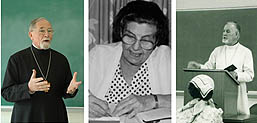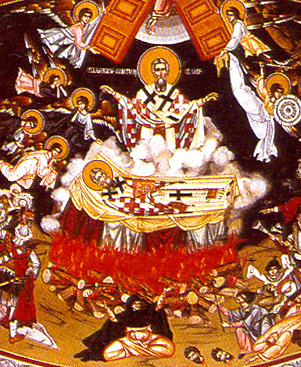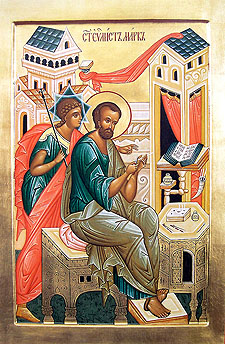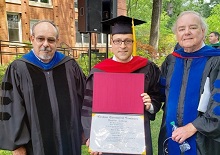Science
Conference in Stutgart, Germany: Stolen Churches or Bridges to Orthodoxy?
25. July 2019 - 10:48 At the Academy of the Diocese of Rotenburg in Stuttgart (Akademie der Diözese Rottenburg Stuttgart), from 19 to 21 July 2019, a conference titled Stolen Churches or Bridges to Orthodoxy?, was organized by the aforementioned Academy and the Ecclesiological Investigations International Research Group.
At the Academy of the Diocese of Rotenburg in Stuttgart (Akademie der Diözese Rottenburg Stuttgart), from 19 to 21 July 2019, a conference titled Stolen Churches or Bridges to Orthodoxy?, was organized by the aforementioned Academy and the Ecclesiological Investigations International Research Group.
Historic recordings of Fr. Schmemann, Fr. Meyendorff, Sophie Koulomzin, others now available from SVOTS
23. July 2019 - 8:17
 “So many brilliant and renowned theologians and teachers have graced the campus of Saint Vladimir’s Orthodox Theological Seminary [SVOTS] over its 80-year history,” said Subdeacon Alexander Hatcher, SVOTS Director of Institutional and Advancement.
“So many brilliant and renowned theologians and teachers have graced the campus of Saint Vladimir’s Orthodox Theological Seminary [SVOTS] over its 80-year history,” said Subdeacon Alexander Hatcher, SVOTS Director of Institutional and Advancement.
“We are so pleased that now you can literally hear their voices in lectures and talks that had been in danger of being lost or forgotten.” Hundreds of old analog recordings of Father Alexander Schmemann, Father John Meyendorff, Father Thomas Hopko, Metropolitan Kallistos Ware, Sophie Koulomzin, Jaroslav Pelikan, and many, many others are now available—for the first time—in digital, online format you can listen to anywhere, anytime for free.” Cosponsored by SVOTS with assistance from the Virginia H. Farah Foundation, the recordings may be accessed by creating a free account (digi.svots.edu).
Saint Basil of Ostrog
11. May 2019 - 20:19 Basil was born in Popovo Selo in Herzegovina, of simple and devout parents. From his youth he was filled with love for the Church of God, and when he grew up he went to the monastery of the Dormi-tion of the Mother of God at Trebinje, and became a monk. As such, he quickly became known for his serious and rare ascetic life, for he loaded himself with ascetic practices, each harder than the last. He was later chosen and consecrated as Bishop of Zahum and Skenderia, much against his will.
Basil was born in Popovo Selo in Herzegovina, of simple and devout parents. From his youth he was filled with love for the Church of God, and when he grew up he went to the monastery of the Dormi-tion of the Mother of God at Trebinje, and became a monk. As such, he quickly became known for his serious and rare ascetic life, for he loaded himself with ascetic practices, each harder than the last. He was later chosen and consecrated as Bishop of Zahum and Skenderia, much against his will.
As a bishop, he first lived in the monastery at Tvrdo"s, whence, as a good pastor, he confirmed his flock in the Orthodox faith, keeping it from the cruelty of the Turks and the guile of the Latins. But when he was too pressed-upon by his enemies, and when Tvrdos* was destroyed by the Turks, Basil moved to Ostrog, where he lived in strict asceticism, protecting his flock by his unceasing and loving prayers. He went peacefully to the Lord in the 16th century, leaving his whole and healing body, uncor-rupt and wonderworking, to the present day.
The Burning of the Relics of St Sava, Archbishop of Serbia
10. May 2019 - 11:12 The body of St Sava was buried at Milegeva. In the time of the Turkish occupation, the Serbian people gathered together round the relics of their saint, to seek support and healing.
The body of St Sava was buried at Milegeva. In the time of the Turkish occupation, the Serbian people gathered together round the relics of their saint, to seek support and healing.
Fearing that a rebellion against the Turks might be stirred up in that place, Sinan Pasha of Belgrade commanded that St Sava's relics be brought to Belgrade and burned there at Vra~ar.
.This was done on April 27th, 1594. But, with the burning of the saint's relics, the wicked Pasha did not burn the saint, who remains alive before the throne of God in heaven and in the hearts of his people on earth.
Apostle and Evangelist Mark
8. May 2019 - 11:57 The Holy Apostle and Evangelist Mark, also known as John Mark (Acts 12:12), was one of the Seventy Apostles, and was also a nephew of Saint Barnabas (June 11). He was born at Jerusalem. The house of his mother Mary adjoined the Garden of Gethsemane. As Church Tradition relates, on the night that Christ was betrayed he followed after Him, wrapped only in a linen cloth. He was seized by soldiers, and fled away naked, leaving the cloth behind (Mark 14:51-52). After the Ascension of the Lord, the house of his mother Mary became a place where Christians gathered, and a place of lodging for some of the Apostles (Acts 12:12).
The Holy Apostle and Evangelist Mark, also known as John Mark (Acts 12:12), was one of the Seventy Apostles, and was also a nephew of Saint Barnabas (June 11). He was born at Jerusalem. The house of his mother Mary adjoined the Garden of Gethsemane. As Church Tradition relates, on the night that Christ was betrayed he followed after Him, wrapped only in a linen cloth. He was seized by soldiers, and fled away naked, leaving the cloth behind (Mark 14:51-52). After the Ascension of the Lord, the house of his mother Mary became a place where Christians gathered, and a place of lodging for some of the Apostles (Acts 12:12).
Saint Mark was a very close companion of the Apostles Peter and Paul (June 29) and Barnabas. Saint Mark was at Seleucia with Paul and Barnabas, and from there he set off to the island of Cyprus, and he traversed the whole of it from east to west. In the city of Paphos, Saint Mark witnessed the blinding of the sorcerer Elymas by Saint Paul (Acts 13:6-12).
First Orthodox christian theologian receive a doctorate in Erskine
6. May 2019 - 20:54 On May 4, 2019, John G. Panagiotou became the first Orthodox Christian theologian to receive a Doctorate in the 182-year history of Erskine Theological Seminary in South Carolina. Erskine Seminary was founded in 1837 and is rooted in the Reformed tradition. It is one if the oldest divinity schools in the American South. Dr. Panagiotou’s dissertation is titled The Path to Oikonomia with Jesus Christ as Our Lighthouse: A Study in the Theology of Christian Stewardship.
On May 4, 2019, John G. Panagiotou became the first Orthodox Christian theologian to receive a Doctorate in the 182-year history of Erskine Theological Seminary in South Carolina. Erskine Seminary was founded in 1837 and is rooted in the Reformed tradition. It is one if the oldest divinity schools in the American South. Dr. Panagiotou’s dissertation is titled The Path to Oikonomia with Jesus Christ as Our Lighthouse: A Study in the Theology of Christian Stewardship.

